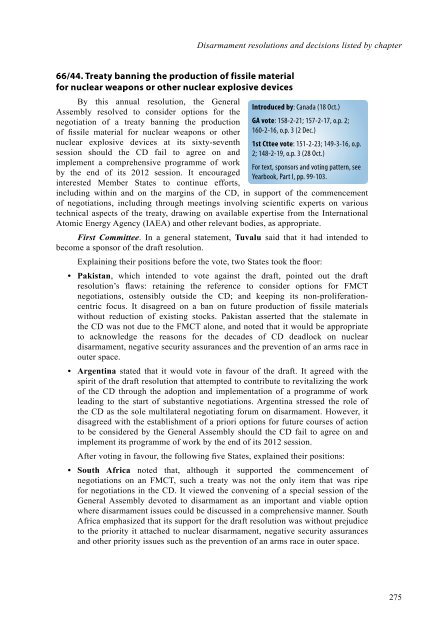DYB2011-Part-II-web
DYB2011-Part-II-web
DYB2011-Part-II-web
Create successful ePaper yourself
Turn your PDF publications into a flip-book with our unique Google optimized e-Paper software.
66/44. Treaty banning the production of fissile material<br />
for nuclear weapons or other nuclear explosive devices<br />
By this annual resolution, the General<br />
Assembly resolved to consider options for the<br />
negotiation of a treaty banning the production<br />
of fissile material for nuclear weapons or other<br />
nuclear explosive devices at its sixty-seventh<br />
session should the CD fail to agree on and<br />
implement a comprehensive programme of work<br />
by the end of its 2012 session. It encouraged<br />
interested Member States to continue efforts,<br />
Disarmament resolutions and decisions listed by chapter<br />
Introduced by: Canada (18 Oct.)<br />
GA vote: 158-2-21; 157-2-17, o.p. 2;<br />
160-2-16, o.p. 3 (2 Dec.)<br />
1st Cttee vote: 151-2-23; 149-3-16, o.p.<br />
2; 148-2-19, o.p. 3 (28 Oct.)<br />
For text, sponsors and voting pattern, see<br />
Yearbook, <strong>Part</strong> I, pp. 99-103.<br />
including within and on the margins of the CD, in support of the commencement<br />
of negotiations, including through meetings involving scientific experts on various<br />
technical aspects of the treaty, drawing on available expertise from the International<br />
Atomic Energy Agency (IAEA) and other relevant bodies, as appropriate.<br />
First Committee. In a general statement, Tuvalu said that it had intended to<br />
become a sponsor of the draft resolution.<br />
Explaining their positions before the vote, two States took the floor:<br />
• Pakistan, which intended to vote against the draft, pointed out the draft<br />
resolution’s flaws: retaining the reference to consider options for FMCT<br />
negotiations, ostensibly outside the CD; and keeping its non-proliferationcentric<br />
focus. It disagreed on a ban on future production of fissile materials<br />
without reduction of existing stocks. Pakistan asserted that the stalemate in<br />
the CD was not due to the FMCT alone, and noted that it would be appropriate<br />
to acknowledge the reasons for the decades of CD deadlock on nuclear<br />
disarmament, negative security assurances and the prevention of an arms race in<br />
outer space.<br />
• Argentina stated that it would vote in favour of the draft. It agreed with the<br />
spirit of the draft resolution that attempted to contribute to revitalizing the work<br />
of the CD through the adoption and implementation of a programme of work<br />
leading to the start of substantive negotiations. Argentina stressed the role of<br />
the CD as the sole multilateral negotiating forum on disarmament. However, it<br />
disagreed with the establishment of a priori options for future courses of action<br />
to be considered by the General Assembly should the CD fail to agree on and<br />
implement its programme of work by the end of its 2012 session.<br />
After voting in favour, the following five States, explained their positions:<br />
• South Africa noted that, although it supported the commencement of<br />
negotiations on an FMCT, such a treaty was not the only item that was ripe<br />
for negotiations in the CD. It viewed the convening of a special session of the<br />
General Assembly devoted to disarmament as an important and viable option<br />
where disarmament issues could be discussed in a comprehensive manner. South<br />
Africa emphasized that its support for the draft resolution was without prejudice<br />
to the priority it attached to nuclear disarmament, negative security assurances<br />
and other priority issues such as the prevention of an arms race in outer space.<br />
275


